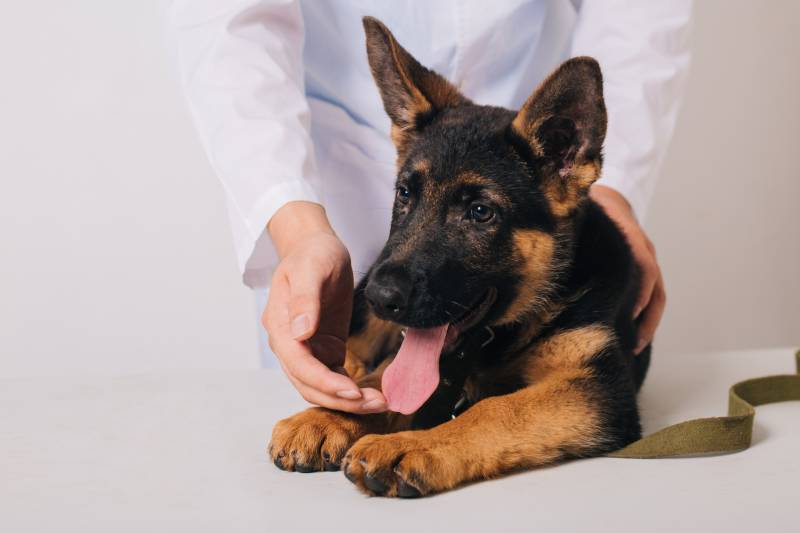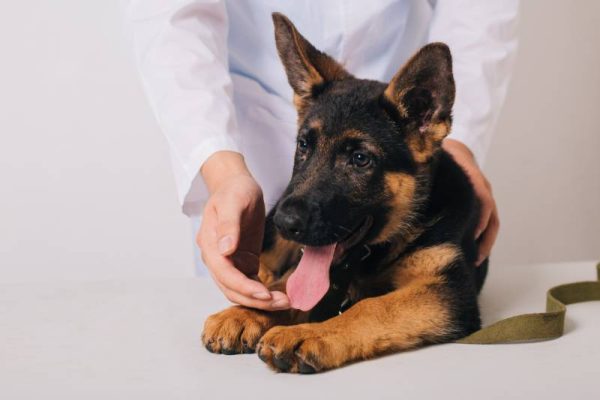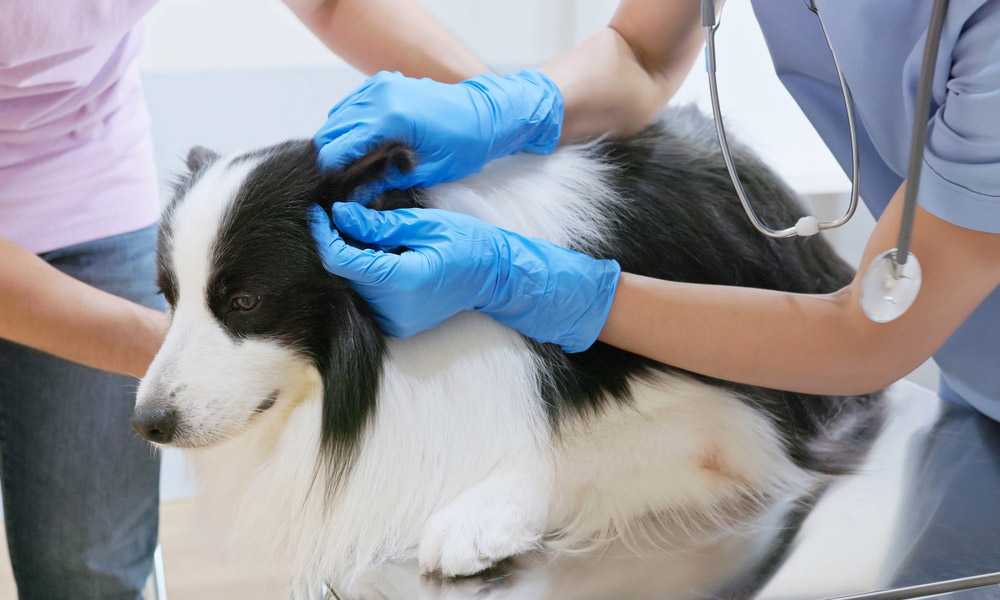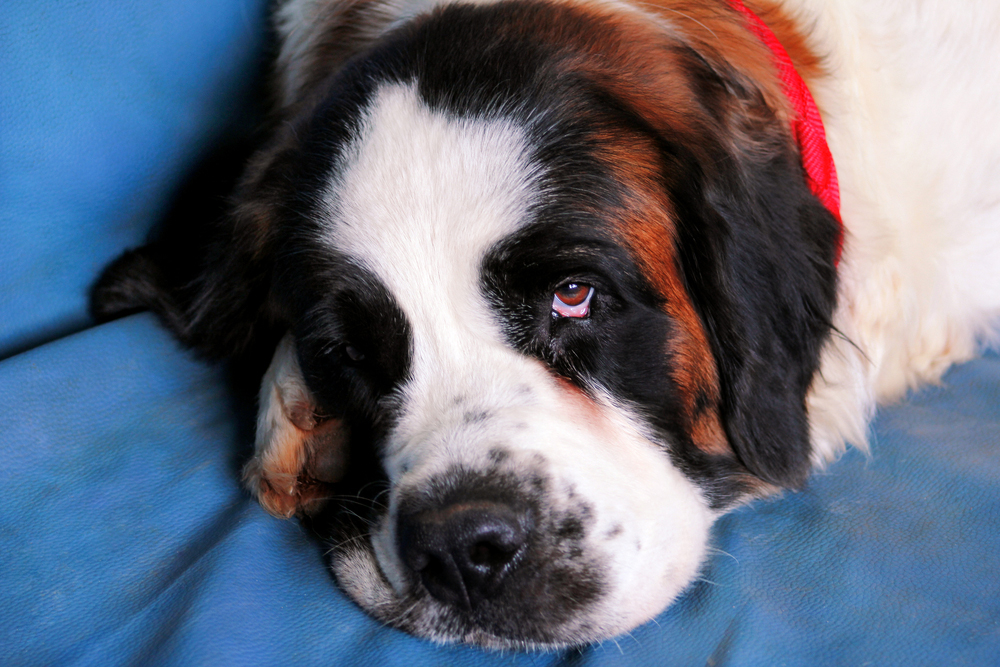Cardiomyopathy in dogs is divided into two major classes: dilated and hypertrophic cardiomyopathy. Dilated cardiomyopathy (DCM) is the most common form of cardiomyopathy found in dogs.
DCM is manifested by the dilation and alteration of the left ventricular function or both ventricles. This condition is found especially in large, middle-aged dogs (4–8 years old), most frequently affecting males. Clinical signs include coughing, exercise intolerance, syncope (fainting), and/or shortness of breath.
DCM cannot be treated. However, the veterinarian will recommend a treatment to improve your dog’s clinical signs and discomfort.

What Is Dilated Cardiomyopathy in Dogs?
DCM is one of the most frequent cardiac pathologies found in dogs. It can be primary (idiopathic, or of unknown causes) and secondary.

- Cardiotoxic
- Genetics
- Ischemia
- Nutrition
- Metabolic
- Inflammatory
In other words, a series of disorders can lead to the development of DCM. This condition is manifested by the alteration and dilation of the left ventricle or both ventricles, which leads to defective functioning of the heart. DCM is found mainly in large and giant breeds that are between 4 and 8 years old. Also, males are more prone than females.
In large dog breeds, DCM leads to heart failure in most cases. The most affected breeds are:
- Boxer
- Great Dane
- Irish Wolfhound
- Saint Bernard
- Doberman Pinscher
The clinical signs with a clinical examination and additional tests (X-rays, electrocardiography, etc.) will help establish the diagnosis of DCM.

What Are the Signs of Dilated Cardiomyopathy in Dogs?
In dogs, DCM has two stages:
- Asymptomatic stage (occult): This stage can be detected by special examinations (e.g., echocardiography, electrocardiography, Holter device, or the dosing of cardiac biomarkers) because affected dogs will not show signs of the disease.
- Clinical stage: In this stage, the specific signs of congestive heart failure occur.
- Fast breathing at rest or when the dog is sleeping
- Restless sleep
- Coughing (due to fluid that has accumulated in the lungs or an enlarged heart that pushes on the trachea, leading to irritation)
- Weakness
- Exercise intolerance
- Fainting
- Collapse
- Decreased appetite
- Weight loss
- Enlarged abdomen (due to fluid accumulation)
- Depression
- Sudden death
For this reason, annual checks at the veterinarian are recommended because they can diagnose heart problems before the clinical signs occur.
What Are the Causes of Dilated Cardiomyopathy in Dogs?
In dogs, DCM can be primary or secondary. In primary DCM, the cause that leads to the appearance of this condition is not known, having genetic determinism. Secondary DCM, as the name suggests, occurs secondary to certain primary conditions, such as:
- Toxicosis (induced by certain substances, such as ethanol or doxorubicin, a chemotherapy drug)
- Infections caused by certain viruses or bacteria (e.g., enterovirus, cytomegalovirus, adenoviruses, Borrelia burgdorferi, or Chlamydia pneumonia)
- Nutritional deficiencies (e.g., carnitine deficiency and taurine deficiency)
- Metabolic diseases (e.g., hypothyroidism)
- Inflammatory disease
DCM can occur in all dog breeds but is most common in:
- Airedale Terrier
- Doberman
- Great Dane
- Saint Bernard
- Boxer (develops arrhythmogenic cardiomyopathy)
- Newfoundland
- Cocker Spaniel
Arrhythmogenic cardiomyopathy is a condition that leads to congestive heart failure. Affected dogs start to cough and have shortness of breath. The disease is inherited but occurs in adulthood, leading to sudden death.
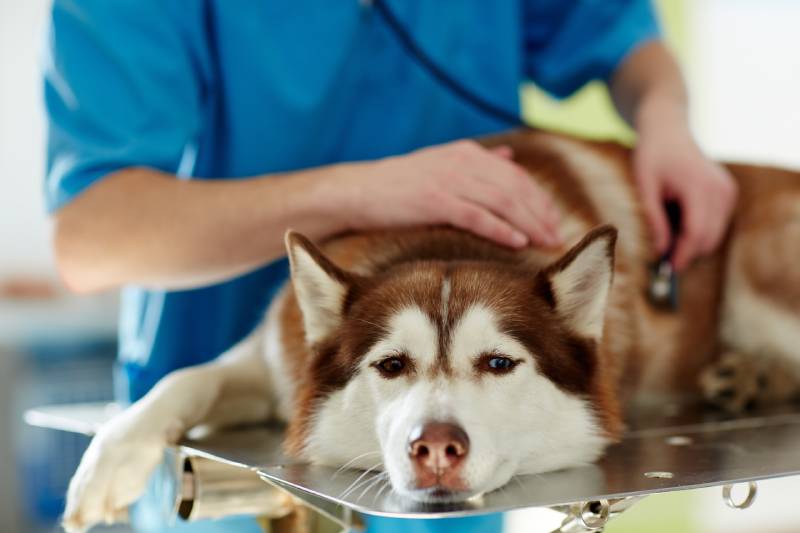
How Is Dilated Cardiomyopathy in Dogs Treated?
The diagnosis of suspicion starts from the clinical examination of your dog and will be confirmed after the cardiologist performs X-rays, cardiac ultrasounds, and an ECG. If the diagnosis of DCM is confirmed, the specialist will establish an appropriate treatment, corroborating your dog’s clinical condition with all the other additional tests that led them to a definite diagnosis.
DCM has no cure, so the therapy has the role of improving heart function and clinical signs. DCM therapy must be adapted according to the evolutionary state of the disease and clinical signs. For example, when clinical signs of congestive heart failure occur, your dog’s therapy will include:
- Diuretic medication
- Vasodilator medication
- Bronchodilator medication
- Antiarrhythmic medication
- Oxygen
- Abdominal puncture in case of ascites (fluid in the abdomen)
How Do I Care For a Dog With Dilated Cardiomyopathy?
If your dog has been diagnosed with DCM, there is not much you can do except follow the instructions of the veterinarian and administer the recommended treatment. The role of treatment is to improve your dog’s heart function and control the clinical signs of congestive heart failure.
In addition, make sure your dog eats a balanced and healthy diet and is not exposed to stress.
Frequently Asked Questions (FAQs)
How Long Can Dogs Live With Dilated Cardiomyopathy?
The prognosis for DCM is varied, with dogs showing signs of congestive heart failure living an average of 6 months after diagnosis. However, some pets can live for 1–2 years. Clinical signs of congestive heart failure include coughing, fainting, enlarged abdomen, shortness of breath, collapse, weakness, and decreased appetite. In some cases, sudden death may occur.
What Should I Feed My Dog That Has Dilated Cardiomyopathy?
If the diagnosis of DCM has been associated with a grain-free diet, it is recommended to change your dog’s food to one that contains standard ingredients like corn, rice, wheat, and chicken or beef. If you have several dogs that consume a free-grain diet but have not been diagnosed with DCM, it is also recommended to change their diet to a standard one. Studies show that the occurrence of DCM may be associated with grain-free diets. Diets containing peas or lentils in high concentrations have also been associated with DCM.

Is Exercise Good for a Dog With Dilated Cardiomyopathy?
If your dog has been diagnosed with DCM, it is recommended to restrict the activities that could increase their heart rate. To keep your dog busy and entertained, encourage them to engage in exercises that mainly stimulate their mind, such as food puzzles.
Conclusion
DCM in dogs is the most common cardiac pathology. This condition is found especially in large and giant breeds and affects middle-aged dogs, with males being more prone than females. Clinical signs can be observed when the dog suffers from congestive heart failure and includes coughing, shortness of breath, lethargy, weakness, fainting, collapse, and lack of appetite. In some cases, DCM can lead to sudden death. This condition has no cure, and the treatment has the role of improving the cardiac function and reducing the clinical signs.
Featured Image Credit: VeronArt16, Shutterstock

